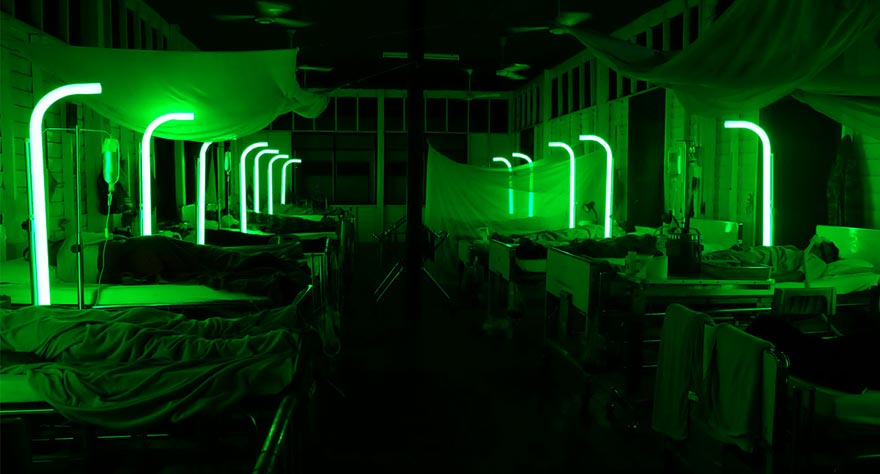
Acclaimed Thai filmmaker Apichatpong Weerasethakul's latest film is a mystifying and wondrous experience.


Acclaimed Thai filmmaker Apichatpong Weerasethakul's latest film is a mystifying and wondrous experience.

Five years after nabbing the Palme d’Or for his 2010 feature, Uncle Boonmee Who Can Recall His Past Lives, Thai filmmaker Apichatpong “Joe” Weerasethakul, has crafted perhaps his most intimate work in over a decade. Instead of enchanting his audience with surrealist imagery, Joe chooses to mystify us by employing tools as transparent as implication and conversation. But he remains a master of controlling the frame, of capturing the unadulterated sounds of nature’s pumping heart, and he deliberately pulls us into a trance, into a world that exists aesthetically between sleep and dreams, but textually between history and the present moment. Bucolic environments throughout the film are observed in their most silent states, yet the sounds that remain despite the emptiness are amplified. Joe navigates spaces that initially appear slight, but focuses on them so intimately that they become wondrous.
Like fellow East Asian filmmaker Tsai Ming-Liang, Joe constructs his takes and their geometry with obsessive deliberation. What sets the two filmmakers apart, at least in terms of what’s visually obvious, is that Joe shoots the majority of his films outdoors, while Tsai’s meditative tone poems are generally consigned to dark interiors. Nature has a constant presence in Cemetery of Splendour. The environments feel sentient, and when the human characters walk through or interact with them, the visible gestures carry the weight of dialogue even though no words are actually spoken. The goal of many filmmakers is to find material worth observing; Joe believes all material is worth observing, and he proves it.
Cemetery of Splendour is set in its director’s hometown of Khon Kaen and stars his frequent collaborator Jenjira Pongpas, whose character, apparently mirroring her director, returns to her childhood home as an adult. She seeks out the school she attended growing up only to find it’s now a makeshift hospital designed to treat a company of soldiers suffering from a mysterious sleeping sickness. The location’s design is immaculate, conflating cloistered objects from its distant past with therapeutic technology that wouldn’t look awry in a modern science fiction film. Enamored by the events taking place in her prior schoolhouse, Jenjira begins tending to a young soldier named Itt (Banlop Lomnoi, co-star of Joe’s Tropical Malady). Itt occasionally breaks through into the waking world, but unless speaking through a telepathic woman named Keng (Jarinpattra Rueangram), he remains trapped in an unyielding slumber.
As the story progresses, we learn that the schoolyard turned hospital was built on a cemetery of kings, and that the restless spirits of these kings feed on the energy of these soldiers, ensnaring them in their own subconscious. Jenjira and the other characters occupying the present slowly begin to comprehend what exactly is going on, and as they do, history’s voice only grows louder. A pair of goddess statues take human form and begin to converse with Jenjira, telling her stories as though she were their contemporary. Viewing the film through western eyes, I can only assume the enigma of its mythology is exacerbated by cultural removal. But even taking this into account, I hesitate to wonder whether the extent of its message has failed to transcend that regional barrier. What Joe has to say seems like something people from all cultures could identify with.
The material in Cemetery of Splendour, while initially alien, is unpacked with grace and explicability. As ancient spirits contact those currently occupying physical bodies, a revelation about the confluence of souls begins to present itself. The high levels of cultural specificity the material appears to impose gets decimated by the universality of the ideology it harbors. Even referring to Joe’s philosophy as ideological seems reductive. He is merely enthralled by the relationships between conscious minds. It doesn’t matter that a hospital has been erected atop a cemetery, just like it doesn’t matter whether clouds look over a river or an ocean sits above the sky. All that matters is that these bodies and the minds that make them unique are in constant dialogue. Forgotten kings can chat with and advise millennial nurses and soldiers, because why wouldn’t they? Every tree, river, animal, and being that ever was and ever will be must rely on one another with the utmost compassion. Otherwise, how could we even bear to live?